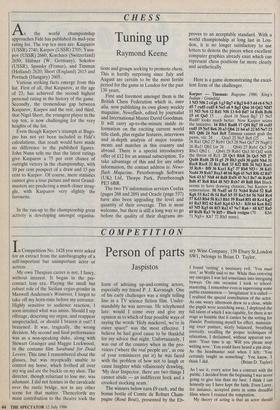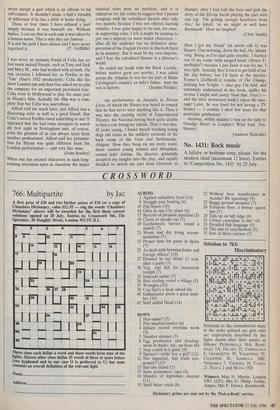COMPETITION Jaspistos
In Competition No. 1428 you were asked for an extract from the autobiography of a self-important but unimportant actor or actress.
My own Thespian career is not, I fancy, without interest. It began in the pre- contact lens era. Playing the small but robust role of the Sicilian organ-grinder in Maxwell Anderson's Winterset, I forgot to take off my horn-rims before my entrance. Highly sensitive to audience reaction, I soon intuited what was amiss. Should I nip offstage, deserting my organ, and reappear unspectacled, or should I brazen it out? I brazened. It was, tragically, the wrong decision. My second and final performance was as a non-speaking duke, along with Stewart Grainger and Maggie Lockwood, in the costume film Saraband for Dead Lovers. This time I remembered about the glasses, but was myopically unable to control my horse, which frothed all over my wig and ate the buckle on my shoe. The director, though reluctant to lose me, was adamant. I did not feature in the cavalcade over the rustic bridge, nor in any other scene for that matter. Thenceforth my main contribution to the theatre took the form of advising up-and-coming actors, especially my friend P. J. Kavanagh. One of his early challenges was a single telling line in a TV science fiction film. Under- standably he was nervous. He telephoned late: would I come over and give my opinion as to which of four possible ways of saying the words 'Holy mackerel, we're in outer space!' was the most effective. I believe he had good cause to be thankful for my advice that night. Unfortunately, I was out of the country when in the pro- vinces (`where the real people are', as one of your reminiscers put it) he was faced with the problem of how not to laugh or cause laughter while villainously drawling, `My dear Inspector, there are two things I cannot abide — an indifferent hock and a crooked stocking seam.'
The winners below earn £9 each, and the bonus bottle of Comte de Robart Cham- pagne (Rosé Brut), presented by the Eb- SW1, belongs to Brian D. Taylor.
I found 'resting' a necessary evil. 'You must rest,' as Wolfit said to me. While thus restoring my energies I was led sometimes into intriguing byways. On one occasion I took to school- mastering. I remember even in supervising some public examination — 'invigilation' it is called I realised the special contribution of the actor. As one weary afternoon drew to a close, while the pupils were scratching away, I deployed the full talent of which I was capable, for there is no stage so humble that it cannot be the setting for Hamlet. Positioning myself for effect, maintain- ing erect posture, nicely balanced, breathing correctly, recalling the proper techniques of relaxation, I declaimed, without apparent ten- sion: 'Your time is up. Will you please stop writing now.' You could have heard a pin drop. As the headmaster said when I left: 'You certainly taught us something'. You know, I
think I did. (Brian D. Taylor)
As I see it, every actor has a contract with the public. I decided from the beginning I was never going to give less than my best. I think I can honestly say I have kept the faith. Even Larry, for instance, accepted parts in some dreadful films where I resisted the temptation.
My theory of acting is that an actor should never accept a part which is an affront to his self-respect. It shouldn't make a hair's breadth of difference if he has a child at home dying.
Three or four times I have refused a part simply because it was beneath me. Without malice, I can say that in each case it was taken by a famous name. That is why they are famous . . . It is not the path I have chosen and I have never regretted it. (T. Griffiths) I was never an intimate friend of Celia but we had many mutual friends, such as Tony and Jack and Mary M., who had worked with us both. On one occasion I followed her as Perdita in the 'Tale' (Gus's 1932 production). Celia did the short London run and dear Gus asked me to join the company for an important provincial tour. Celia went to Hollywood to play the same part in Hiram's film. Actually the film was a com- plete flop but Celia was marvellous.
Alfred told me much later, and Alfred was a discerning critic as well as a good friend, that Celia's screen Perdita owed something to me! It appeared that she had come incognito to watch my first night in Nottingham and, of course, even the greatest of us can always learn from another professional. Alfred said her presenta- tion for Hiram was quite different from the London performance — and very like mine.
(John Stanley) When one has created characters in such long- running television epics as Junctions the major classical roles pose no problem, and it is ridiculous for the critics to suggest that I parted company with the subsidised theatre after only two months because I was not offered starring vehicles. I was quite happy to be cast, for once, in supporting roles. I felt it might be exciting to put one's impress on more minor characters after all the audience has no definitive inter- pretation of the English Doctor in Macbeth fixed in its memory. But it must be my own impress, and I fear the subsidised theatre is a director's world.
So ended my brush with the Bard. Luckily, before matters grew too acerbic, I was called across the Atlantic to test for the part of Blake Carrington's cousin's ex-wife's father. And the rest is history. (Jeanne Fielder) . . . my performance as Amanda in Private Lives, of which the Master was heard to remark that he had never seen anything like it. Then it was into the exciting world of Experimental Theatre, the National having been quite unable to find a role fitting my talents. Thus it was that, 42 years young, I found myself teaching young dogs old tricks in the unlikely environs of the back room of the Goat and Stethoscope, Aldgate. How they hung on my every word, those earnest young women and sheepskin- coated lads! Adrian, the director, gratefully accepted my insights into the play, and rapidly decided to switch my part from Gertrude to Hamlet, after I had told the boys and girls the story of the Divine Sarah playing the part with one leg. 'I'm getting enough heartburn from this,' he joked, 'so we might as well have Bernhardt.' How we laughed!
(Chris Smith) How I got my 'break' (as actors call it) was bizarre. One morning, down the hall, the 'phone rang. Being as I've said quite psychic, I hurtled out of my room 'with winged heels' (Henry V, methinks?) because I just knew it was for me. I was right. Actually they'd tried to get hold of me the day before, but I'd been at the movies: Franco's (Zeffirelli's) remake of The Champ, starring Jon Voight — nice guy I'm told, and extremely underrated in my book, unlike his co-star I might add (sorry 'bout that, Faye!) and the idiot downstairs hadn't taken the mes- sage! Later, he was fined for not having a TV licence — I confess I shed few tears for that particular gentleman!
Anyway, within minutes I was on the tube to Goodge Street in London's West End. Yes, bizarre!
(Andrew Nickolds)



















































 Previous page
Previous page